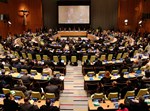Social Watch E-Newsletter - Issue 269 - August 12, 2016
Published on Fri, 2016-08-12 19:01
 |
| Issue 269 - August 12, 2016 |
|
|
Social Watch reports
Spotlight report on the 2030 Agenda
|
|
|
| |
|
| |
Integrating the 2030 Agenda into Finland's domestic policy framework
|
| |
|
| |
 |
The main challenge in implementing the 2030 Agenda in Finland will be integrating the principles and targets of sustainable development into all of the country's domestic policies, including those policies related to developing countries. Genuine political commitment is a prerequisite for implementing the 2030 Agenda broadly and coherently throughout the public administration. Different stakeholders have to be engaged and also take responsibility for implementing the goals. Implementation has to be monitored not only globally but also regionally. This requires sufficient planning, coordination and allocation of resources, which in turn requires political commitment to implementing the universal goals but also prioritizing policy actions in order to get a serious and efficient start. Committing to the goals means that attaining them is mainstreamed into all decision-making, and not just considered in a separate action plan. It is important to understand the 2030 Agenda in a holistic way, so that for example gender equality is not only a separate goal but also a cross-cutting theme. Read more
|
| |
|
| |
|
| |
Malaysia: Can the 2030 Agenda work with neoliberal planning?
|
| |
|
| |
 |
The incorporation of the 2030 Agenda and the SDGs into the national development plan-- Eleventh Malaysia Plan 2016-2020 –and Malaysia’s approach to the SDGs demonstrate the same neoliberal biases, aims and agenda of all development plans since 2009. Will it belie the same fetishes for GDP or market/corporate stratagems instead of real socio-economic development plans? Does it package structural adjustment and austerity plans in the guise of ‘rationalizing’ and ‘integrating’ limited resources, funding and collaborative programmes? Will the imaginary crisis of a ‘middle-income trap’ continue to occupy the policy agenda, as opposed to the real crisis of the increasing income divide between the few who have and the many who have not?
The Malaysian Government has tied implementation of the Sustainable Development Goals (SDGs) to its Eleventh Malaysia Plan (11MP) 2016–2020 as the centrepiece and guiding policy of national development efforts. The Tenth Malaysia Plan, the New Economic Model (NEM), launched in 2009, and the Economic Transformation Programme (ETP), had all some common aims, such as: to achieve a ‘high-income’ goal of per capita gross national income of USD15,000 by 2020; to attract more foreign and domestic direct investments; and to liberalize, deregulate, and privatize more of the national economy.
But while much rhetoric is duly spewed on ‘distribution’ issues, there appears very little of significance that actually gets carried out in relation to addressing socio-economic inequality, deprivation and marginalization. Read more
|
| |
|
| |
|
| |
Social Watch coalitions around the world are contributing their assessments and reports to the global Social Watch report 2016, under the overall theme Goals for 2030... and obstacles to getting there. The Social Watch network thus joins the current global discussions around a set of Sustainable Development Goals (SDGs) and on a new development framework and the need for civil society monitoring.
The Social Watch national platforms are independent coalitions of civil society organizations struggling for social and gender justice in their own countries. The Social Watch network has been publishing since 1996 yearly reports on how governments implement their international commitments to eradicate poverty and achieve equality between women and men.
|
| |
|
| |
|
| |

A session of the HLPF. (Photo: UN)
|
The United Nations High-Level Political Forum (HLPF) met in New York from 11 to 20 July 2016. It is the central UN body addressing sustainable development, and its chief task is to monitor the implementation of the 2030 Agenda and its global Sustainable Development Goals (SDGs).
The Forum neither has any concrete decision-making powers nor does it perform a direct coordinating role vis-à-vis governments and UN organizations. It primarily serves the purpose of sharing information on strategies to implement the 2030 Agenda, presenting national (success) stories and critically analyzing obstacles and setbacks in achieving the SDGs.
The HLPF is still in a trial phase. Whether it can justifiably claim a central role in global sustainability policy will only be revealed over the next few years. Read more
|
|
| |
|
| |
|
| |

Photo: UN
|
Vulture funds are inherently exploitative, since they seek to obtain disproportionate and exorbitant gains at the expense of the full realization of human rights, particularly economic, social and cultural rights, and the right to development, the UN Human Rights Council Advisory Committee has said.
In its latest report on the activities of vulture funds and their impact on human rights, the Advisory Committee said that seeking the repayment in full of a sovereign debt from a State that has defaulted, or is close to default, is an illegitimate outcome.
. Read more
|
|
| |
|
| |
|
| |
 |
A fundamental distinction that has come to the foreground with the onset of the economic crisis has been between the European Union (EU) rules and those of the Council of Europe. Indeed, the study of human social rights at the European level must include this dual perspective. That is because the European Social Charter Treaty (“the Charter†or “the ESCâ€), adopted within the Council of Europe, allows individuals to demand rights that are being violated by quite restrictive tax, labor, commercial and other legislative reforms and measures being imposed as a requirement by some European community institutions. These are, in particular, those that are part of the troika (which comprises the International Monetary Fund, the European Commission and the European Central Bank). The measures come attached to financial assistance being received by some countries in order to overcome the situation of bankruptcy in which they find themselves, or are the consequence of some rulings by the Court of Justice of the European Union. Read more
|
|
| |
|
|
|
| |
|
SOCIAL WATCH IS AN INTERNATIONAL NGO WATCHDOG NETWORK MONITORING POVERTY ERADICATION AND GENDER EQUALITY Social Watch >>
Social Watch E-Newsletter For comments, sugestions, collaborations contact us at: socwatch@socialwatch.orgTo stop receiving this newsletter send a message with the subject "unsubscribe" to: socwatch@socialwatch.org |
|
|
|
|
